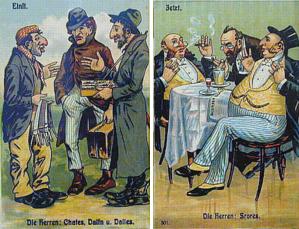
The fact that the Jewish people have been dispersed through the world but maintained their cohesion and own religion in established Jewish communities has always caused occasional outbursts of racial hatred against them through history. Until 1873 these outbursts did not differ in character or intensity from events of persecution suffered by other religious groups. At other times Jews enjoyed lengthy periods of good relations with neighbours and were appreciated for their contributions to the community as a whole.
As a foreign element in all countries Jews did not have the right to own land. In medieval Europe they were not allowed to join the guilds and could therefore not exercise a trade. They concentrated on the two areas of economic activity open to them, commerce and medicine, and established special medical and commerce schools for their youth.
Over the centuries Jewish doctors were held in high esteem by Christian and Muslim royal houses. Jewish merchants and bankers began to dominate commerce in many countries and played an important role in their economy. Again, the situation is not characteristic of only the Jewish community. Economic dominance of a particular group often develops wherever that group is denied access to land ownership and a range of occupations.
Modern examples can be found in colonial history. Indians brought to Fiji by the British were barred from land ownership and now dominate commerce in the country; the election of an Indian prime minister in 1999 resulted in a coup of the Fijian traditional chiefs and in the exclusion of Indians from power. Chinese brought to Malaya but excluded from land ownership now dominate large parts of the Malaysian economy. Indians brought into Uganda by the British were also not allowed the purchase of land and soon dominated the country's commerce; they were forcibly expelled in 1972 by the dictator Idi Amin, causing the breakdown of Uganda's economy.
Jews suffered similar fates on several occasions in history (for example in 1496, when they were expelled from Portugal, and in 1502, when they were driven from Spain) After the economic crisis of 1873, the first major cyclic crisis experienced by the newly founded German Reich, anti-semitism took on a new dimension. The fact that banks always survive a collapsing economy better than industry, combined with the large presence of Jews in their board rooms, created extremely virulent antisemitic feelings, fanned and exploited by ruthless demagogues.
The National Socialists did not invent anti-semitism, they drew on its presence and turned it into a programme of genocide - the Holocaust - that became totally unrelated to economic developments in Germany. Only 210,000 of the 6 million Jews killed by the Nazis were German Jews, the majority had lived in eastern Europe, most of them in Poland.
Zionism - the plan to establish a Jewish state in the area where Jews lived at the time of Jesus' death - is another result of the virulent German anti-semitism of the late 19th century. Its founder Theodor Herzl (1860 - 1904) published the pamphlet The Jewish State in 1896 and organized the first Zionist Congress in 1897. The modern state of Israel is not a secular state but a state based on the Jewish religion that discriminates against non-Jews in similar ways as European countries discriminated against Jews for centuries. Its Arab and other non-Jewish citizens are subject to special marriage laws; they are not allowed to join Jewish trade unions and suffer many other restrictions.
| country | Jews killed | percent of Jewish population |
| Poland | 3,000,000 | 90% |
| Germany | 210,000 | 90% |
| Czechoslovakia | 155,000 | 86% |
| Holland | 105,000 | 75% |
| Hungary | 450,000 | 70% |
| Ukraine | 900,000 | 60% |
| Roumania | 300,000 | 50% |
| Russia | 107,000 | 11% |

A German anti-semitic postcard from the time before National Socialism came to power: "Then and now."